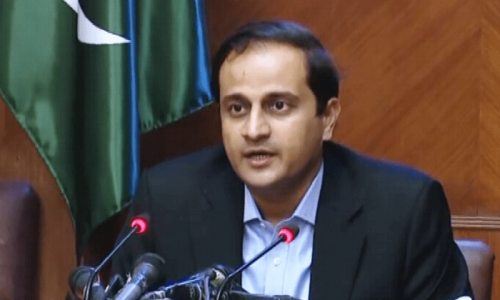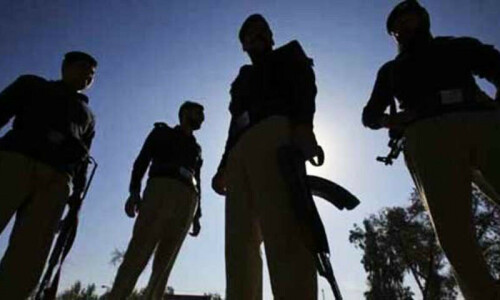KARACHI: Blaming the Karachi Water and Sewerage Board (KWSB) for the continuing water crisis faced by the city, Shehri-Citizens for a Better Environment provided a platform to discuss the water shortage problem and hold accountable various organisations and political parties at the centre of the issue.
A panel discussion was held at a hotel on Thursday where solutions were suggested by representatives of organisations directly or indirectly connected to the supply of water to Karachi.
Amber Alibhai of Shehri raised questions about the lack of regularisation of the KWSB and the rise of an illegal system of water dissemination in the city.
“We had invited all members of the KWSB but, as you can see, only one representative is sent. We are collectively suffering and we need to collectively adopt a broad-based, non-partisan solution to this problem,” she said.
Lawmakers of the Pakistan Tehreek-i-Insaf (PTI) and the Muttahida Qaumi Movement (MQM), Syed Hafeezuddin and Syed Khalid Ahmed, respectively, were also part of the panel and they shared their respective party’s manifesto concerning the water crisis to an audience much starved of an official narrative to their problems.
For Khalid Ahmed of the MQM, the issue could be easily managed with a few changes to the functioning of the KWSB. “The pumping stations at Dhabeji and Gharo are very old and not working efficiently. Also, these pumping stations face regular loadshedding that sets them back several hours. These need to be rectified immediately,” he said.
Suggesting ways on improving the water distribution network, he stressed the need to penalise violators. “Make illegal water connections a non-bailable offence and see how quickly water theft can be controlled.” He was, however, criticised for not sharing his party’s official plan of action and not addressing concerns raised by many present about the role of the MQM in contributing to this crisis.
No representative of the PPP was present at the discussion, and organisers had to play a short clip of a previously-held interview of Senator Taj Haider that displayed the disconnect of the Sindh government regarding the adoption of a more practical approach to resolving the crisis.
PTI’s Syed Hafeezuddin gave a more honest analysis of his party’s aim, and lamented the bureaucratic structure of the KWSB that has highlighted rampant corruption and inefficiency in its day-to-day functioning. “There is an unofficial network running parallel, with the sanction of the KWSB, which has allowed the water crisis to aggravate. This is because there is a lot of money involved in this business for all the stakeholders, including the KWSB,” he said.
“Restructuring the KWSB is the only way forward.”
Chief engineer Jawed Shamim, representing the KWSB, offered very little in terms of a developed policy on the immediacy of mitigating the impact of the water shortage. He did address the concerns of those present but overall shared his sense of helplessness as a representative of the KWSB. In fact, Mr Shamim is set to retire within the year, and is not in a position to introduce change within the organisation, a fact that drew a few laughs from the audience.
Dr Noman Ahmed of the NED University spoke about the need for a three-pronged attack to tackle the lack of a tangible plan to address the crisis. “Identifying whether the supply of water should be the state’s responsibility or a commercial enterprise is important,” he said.
He also outlined a few measures that needed to be taken to make the KWSB a more financially viable institution. “It is only possible through a decentralised billing recovery network to allow the KWSB to recover its cost. Better functioning of the board will also attract a better workforce and management cadres.”
Representatives of the All Karachi Water Tanker Association were also present at the discussion and the overall stream of thought stressed the need for overhauling the KWSB instead of taking mere cosmetic, short-term measures.
Published in Dawn, June 5th, 2015
On a mobile phone? Get the Dawn Mobile App: Apple Store | Google Play














































